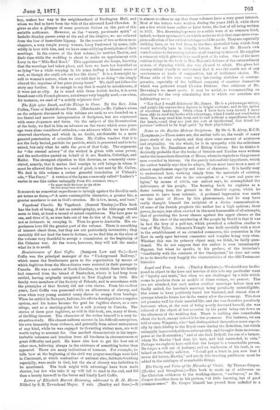The Life after Death, and the Things to Come. By
the Rev. John Cullen, Vicar of Radoliffe-on-Trent. (Hatchards.)—Mr. Cullen's views on the subjects discussed in this volume are such as are founded on a too literal and narrow interpretation of Scripture, but are expressed with some eloquence and force. On the subject of the Resurrection of the body, we find in him an advance on the views which some years ago were alone considered orthodox,—an advance which we have also observed elsewhere, and which is, no doubt, attributable to a more general penetration of scientific ideas. Mr. Cullen teaches that it is not the body buried, particle for particle, which is preserved and is to be raised, but only what he calls the germ of that body. The argument for "the eternal misery " of the wicked is given with some power, and the authorities quoted on behalf of it are Ruskin, Coleridge, and Butler. The strongest objection to this doctrine, as commonly enun- ciated, namely, that it makes God consign to evil beings in whom it must be allowed that there is a seed of good, is not met by Mr. Cullen. We find in this volume a rather graceful translation of Uhlaod's ode, " The Ferry." A version of the hymn commonly called " Luther's " varies in one line rather unhappily from the common one,— " To meet their Saviour in the skies
On this auspicious morning."
It seems to us somewhat superfluous to inveigh against the Devil in such set terms as these,—"A more contemptible character, a greater liar, a greater murderer is not in God's creation. He is low, mean, and base."
Vagabond Charlie. By Vagabond. (Samuel Tinsley.)—This book has the look of being, if not an autobiography, as the title-page would seem to hint, at least a record of actual experiences. The hero goes to sea, and tires of it, as nine lads out of ten do tire of it, though all are not so fortunate in escaping it. Then ho goes to Australia. His ex- periences here fill the greater tart of the volume. There is something of interest about them, but they are not particularly instructive; they certainly did not lead the hero to fortune, as we find him at the close of the volume very thankful to accept a commission at the beginning of the Crimean war. At the worst, however, they will tell the reader what he is to avoid.


































 Previous page
Previous page